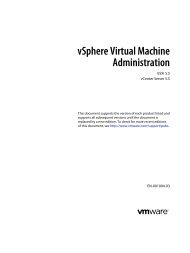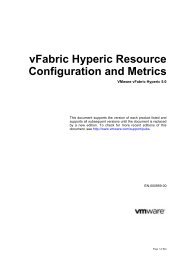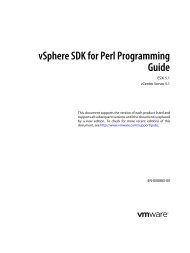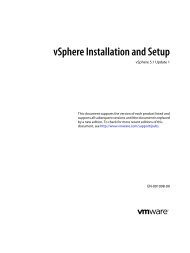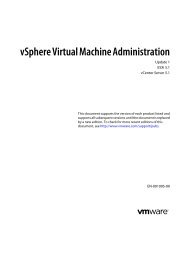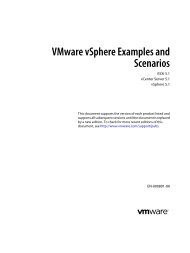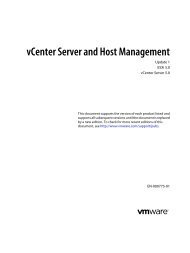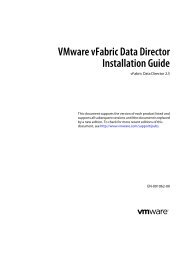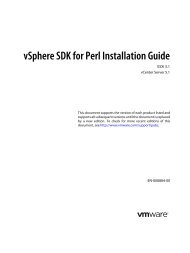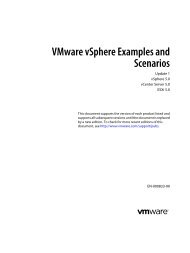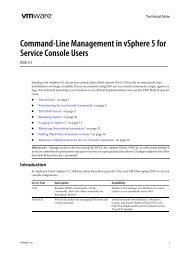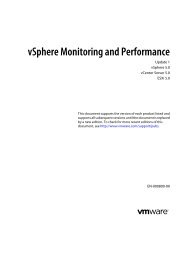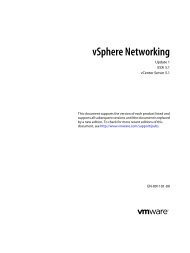vSphere Storage - ESXi 5.1 - Documentation - VMware
vSphere Storage - ESXi 5.1 - Documentation - VMware
vSphere Storage - ESXi 5.1 - Documentation - VMware
You also want an ePaper? Increase the reach of your titles
YUMPU automatically turns print PDFs into web optimized ePapers that Google loves.
<strong>vSphere</strong> <strong>Storage</strong><br />
Hardware Acceleration Requirements<br />
The hardware acceleration functionality works only if you use an appropriate host and storage array<br />
combination.<br />
Table 21-1. Hardware Acceleration <strong>Storage</strong> Requirements<br />
<strong>ESXi</strong> Block <strong>Storage</strong> Devices NAS Devices<br />
ESX/<strong>ESXi</strong> version 4.1 Support block storage plug-ins for<br />
array integration (VAAI)<br />
<strong>ESXi</strong> version 5.x Support T10 SCSI standard or block<br />
storage plug-ins for array integration<br />
(VAAI)<br />
Not supported<br />
Support NAS plug-ins for array<br />
integration<br />
NOTE If your SAN or NAS storage fabric uses an intermediate appliance in front of a storage system that<br />
supports hardware acceleration, the intermediate appliance must also support hardware acceleration and be<br />
properly certified. The intermediate appliance might be a storage virtualization appliance, I/O acceleration<br />
appliance, encryption appliance, and so on.<br />
Hardware Acceleration Support Status<br />
For each storage device and datastore, the <strong>vSphere</strong> Client and the <strong>vSphere</strong> Web Client display the hardware<br />
acceleration support status.<br />
The status values are Unknown, Supported, and Not Supported. The initial value is Unknown.<br />
For block devices, the status changes to Supported after the host successfully performs the offload operation.<br />
If the offload operation fails, the status changes to Not Supported. The status remains Unknown if the device<br />
provides partial hardware acceleration support.<br />
With NAS, the status becomes Supported when the storage can perform at least one hardware offload<br />
operation.<br />
When storage devices do not support or provide partial support for the host operations, your host reverts to<br />
its native methods to perform unsupported operations.<br />
Hardware Acceleration for Block <strong>Storage</strong> Devices<br />
With hardware acceleration, your host can integrate with block storage devices, Fibre Channel or iSCSI, and<br />
use certain storage array operations.<br />
<strong>ESXi</strong> hardware acceleration supports the following array operations:<br />
n Full copy, also called clone blocks or copy offload. Enables the storage arrays to make full copies of data<br />
within the array without having the host read and write the data. This operation reduces the time and<br />
network load when cloning virtual machines, provisioning from a template, or migrating with vMotion.<br />
n Block zeroing, also called write same. Enables storage arrays to zero out a large number of blocks to provide<br />
newly allocated storage, free of previously written data. This operation reduces the time and network load<br />
when creating virtual machines and formatting virtual disks.<br />
n Hardware assisted locking, also called atomic test and set (ATS). Supports discrete virtual machine locking<br />
without use of SCSI reservations. This operation allows disk locking per sector, instead of the entire LUN<br />
as with SCSI reservations.<br />
Check with your vendor for the hardware acceleration support. Certain storage arrays require that you activate<br />
the support on the storage side.<br />
216 <strong>VMware</strong>, Inc.



